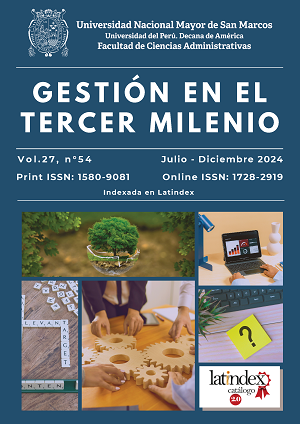Exploring Herzberg's motivation theory: a theoretical review of its impact on aspects valued by organizations
DOI:
https://doi.org/10.15381/gtm.v27i54.27596Keywords:
work motivation, Herzberg's theory, motivational factors, hygiene factorsAbstract
Work motivation is a topic that, over the years, continues to be considered important, as it can help organizations to have workers with the desire to achieve their goals and, thus, contribute to the growth of the organization. There are various motivation theories that have emerged, including Herzberg's theory, which can be applied today through its motivational and hygiene factors. The objective of this paper is to explain this theory and demonstrate that its factors have an impact on aspects valued by organizations. To do so, different papers related to the topic were reviewed, finding out that there is an impact on aspects such as staff turnover, absenteeism, work environment, job performance and productivity if both factors are implemented in organizations. The conclusion was that the motivational factors that have an impact are recognition, the work itself, responsibility, progress, growth, achievement. The hygiene factors that have an impact are working conditions, salary, security, company policy and administration, personal life, relationships with supervisors and colleagues.
Downloads
Published
Issue
Section
License
Copyright (c) 2024 Yanira Gibu La Torre

This work is licensed under a Creative Commons Attribution 4.0 International License.
THE AUTHORS RETAIN THEIR RIGHTS:
(a) The authors retain their trademark and patent rights, and also over any process or procedure described in the article.
(b) The authors retain the right to share, copy, distribute, execute and publicly communicate the article published in Gestión en el Tercer Milenio journal (for example, place it in an institutional repository or publish it in a book), with acknowledgment of its initial publication in the Gestión en el Tercer Milenio.
(c) Authors retain the right to make a subsequent publication of their work, to use the article or any part of it (for example: a compilation of their work, lecture notes, thesis, or for a book), provided that they indicate the source. of publication (authors of the work, magazine, volume, number and date).






